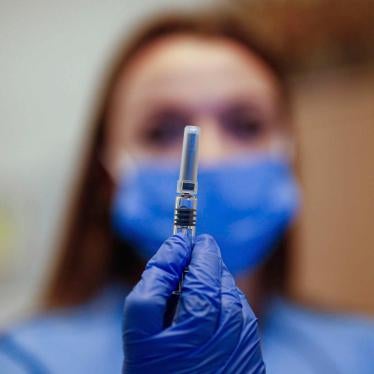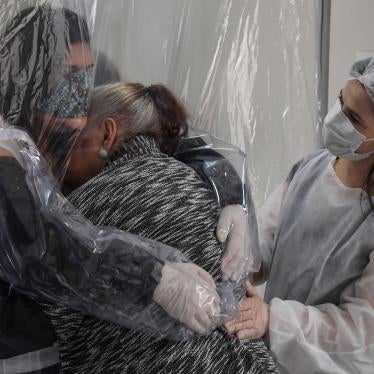(Geneva) – Governments should stop blocking a temporary waiver of some global intellectual property rules that will help boost global access to Covid-19 vaccines, Amnesty International and Human Rights Watch said ahead of a key World Trade Organization (WTO) meeting in Geneva on December 10, 2020. If adopted, the waiver proposal would enable more governments to fulfill their obligations to respect the rights to life and health. The call comes as vaccinations for Covid-19 begin in the United Kingdom, and are likely to begin in other countries in the near future.
At the WTO meeting, the governments will discuss a proposal by India and South Africa to temporarily waive some provisions of the Trade Related Aspects of the Intellectual Property Rights (TRIPS) Agreement. The proposal would facilitate technology transfers so that Covid-19 medical products, including vaccines, could be produced quickly and affordably by manufacturers around the world. Higher-income countries have already made deals to buy up the vast majority of the world’s potential vaccine supplies for 2021, so the move would help scale up access for people in lower-income countries.
“The proposal by India and South Africa is designed to help governments grapple with the ongoing extraordinary global health crisis,” said Bruno Stagno Ugarte, deputy executive director for advocacy at Human Rights Watch. “Governments should swiftly adopt this proposal so they’re better able to make life-saving medical products, including vaccines, available and affordable for all.”
Kenya, Eswatini, Mozambique, and Pakistan have joined India and South Africa to co-sponsor the waiver proposal. The proposal was welcomed or supported by 100 countries, most of them low- or middle-income. But a small group of high-income countries and their trading partners have opposed it; including Brazil, the European Union, Canada, the United States, Japan, and the United Kingdom.
Some of these governments claim that existing flexibilities in global intellectual property rules are sufficient to allow for compulsory licensing in low- and middle-income countries. But past practice shows that these tools are hard to use, and that greater flexibilities are needed to meet the scale of the global challenge posed by Covid-19.
“We can only put an end to Covid-19 if governments recognize their human rights obligations and ensure that those most in need of life-saving vaccines are not left behind,” said Tamaryn Nelson, Amnesty International’s adviser on the right to health. “Agreeing to the TRIPS waiver is a crucial way for states to demonstrate that they are fully committed to immediately doing whatever is necessary to protect the right to health of billions of people, no matter where they live.”
Governments have obligations to ensure that all countries share the benefits of scientific research, and not to interfere with other countries’ ability to fulfill their obligations under the rights to health and life. These include securing access to medical products and treatments needed to respond to Covid-19, including vaccines.
All countries should support the waiver to facilitate universal and fair access to these potentially life-saving interventions, Amnesty International and Human Rights Watch said. All vaccine developers, including Pfizer-BioNTech, Modern, and Oxford/AstraZeneca, should endorse and participate in the World Health Organization’s Covid-19 Technology Access Pool, to facilitate sharing of intellectual property and know-how.
A group of United Nations human rights experts recently issued a joint statement welcoming the proposed waiver, and highlighting that the existing TRIPS framework “may have an adverse impact on prices and availability of medicines.” They reminded governments that intellectual property rights should not be a barrier to their international human rights obligations, to share the benefits of scientific research widely, and in furtherance of their human rights obligations.
Background
The WTO meeting comes in the midst of several promising developments regarding the Covid-19 vaccine candidates. On December 3, the United Kingdom issued an emergency use authorization for Pfizer/BioNTech’s vaccine candidate. The company has already committed most of its doses to a handful of rich countries that could afford to pre-order. Moderna, which has also submitted its vaccine to regulators for approval, has also committed most of its doses to rich countries, but also announced that it will not enforce its “Covid-19- related patents against those making vaccines intended to combat the pandemic.”
Amnesty International and Human Rights Watch have documented the devastating human rights impacts of the pandemic, and urged global cooperation in the response. All governments have human rights obligations to protect the rights to life and health, and to ensure that the benefits of scientific research are available as widely as possible to protect people’s lives, health, and livelihoods. This includes extraterritorial obligations towards other states. The UN Committee on Economic, Social and Cultural Rights (CESCR) has also outlined that this includes ensuring that international trade agreements “do not adversely impact upon the right to health.”
An October 2020 report by the United Nations Conference on Trade and Development stated that there is “[s]ubstantial evidence that middle- and low-income countries have been largely priced out from access to Covid-19 related products. Despite efforts to facilitate access to Covid-19 supplies, trade statistics show that only a tiny fraction of the additional world production of Covid-19 related supplies have reached low-income countries.”
Moreover, shortages of testing reagents and therapeutic drugs in some parts of the world have been linked to companies’ licensing practices. Early in the pandemic, the lawyers for the original patent holder warned volunteers in Italy who produced 3-D-printed valves for use in ventilators, that they could face legal action if they continued to manufacture without a license.
For more information, please see a recent report from Medecins sans Frontieres (MSF) “ WTO Covid-19 TRIPS waiver proposal Myths.”
|
News Release
Urgently Waive Intellectual Property Rules for Vaccine
Right to Life, Public Health Demand Extraordinary Cooperation, Sharing
Your tax deductible gift can help stop human rights violations and save lives around the world.
Region / Country
Tags
Most Viewed
-
February 24, 2026
Iran: Tsunami of Arbitrary Arrests, Enforced Disappearances

-
May 24, 2016
Stifling Dissent

-
November 25, 2019
A Dirty Investment

-
June 3, 2025
“They’re Ruining People’s Lives”

-
January 25, 2024
“We’re Dying Here”


